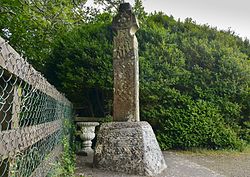Kinnitty Cross
| Kinnitty Cross | |
|---|---|
| Native name Irish: Ardchros Chionn Eitigh | |
 | |
| Type | High cross |
| Location | Castletown and Glinsk, Kinnitty, County Offaly, Ireland |
| Height | 2.4 m (8 feet) |
| Built | 6th century |

Kinnitty Cross is a high cross and National Monument located near Kinnitty, County Offaly, Ireland.
Location
Kinnitty Cross is in the grounds of Castle Bernard, built on the west bank of the River Camcor, about 1.5 km (1 mile) east of Kinnitty village.
History
Saint Finnian of Clonard (470–549) built a monastery on the site, and the high cross is associated with this monastery.
Local legend claims that the cross was erected by a St. Colman to commemorate the conversion of his father, Óengus mac Nad Froích (430–489), by Saint Patrick. The cross was covered with carvings in the 9th century by Máel Sechnaill mac Máele Ruanaid (d. 862), High King of Ireland.
Description
The cross is made of sandstone (not of local origin) and stands 2.4 metres (7.9 ft) high.
The head of the cross is damaged and largely missing. The rest of the cross contains numerous richly decorated panels of Biblical scenes, such as the Crucifixion of Jesus, David playing the lyre, and Eve handing the apple to Adam. A weathered inscription attributes the cross to Máel Sechnaill mac Máele Ruanaid, King of Tara from 846-862AD.[1][2]

